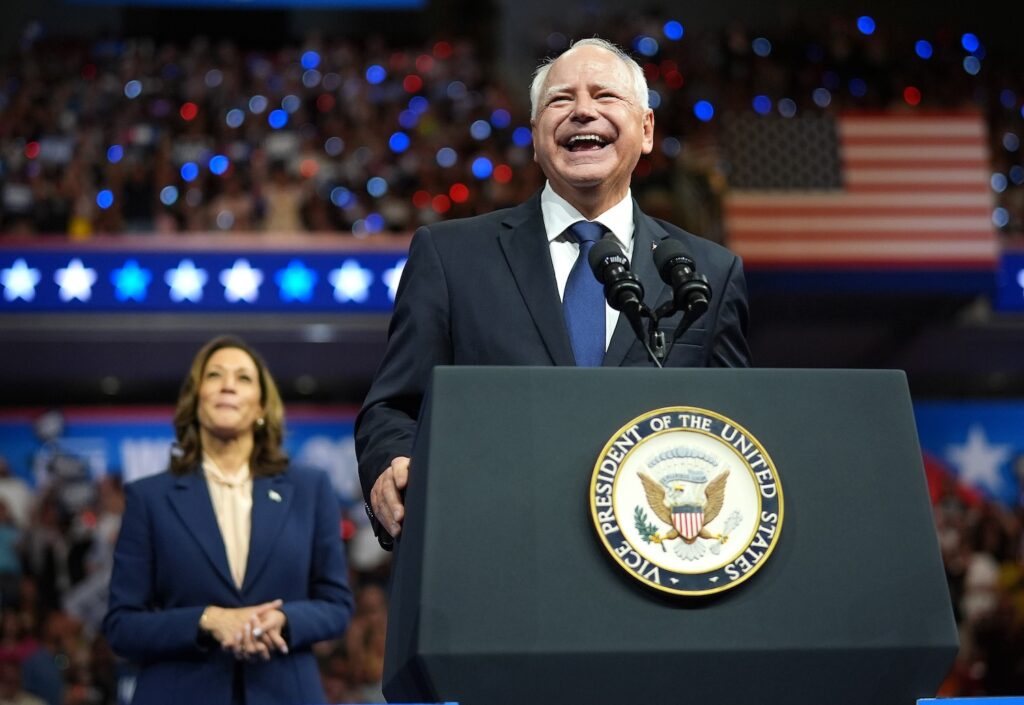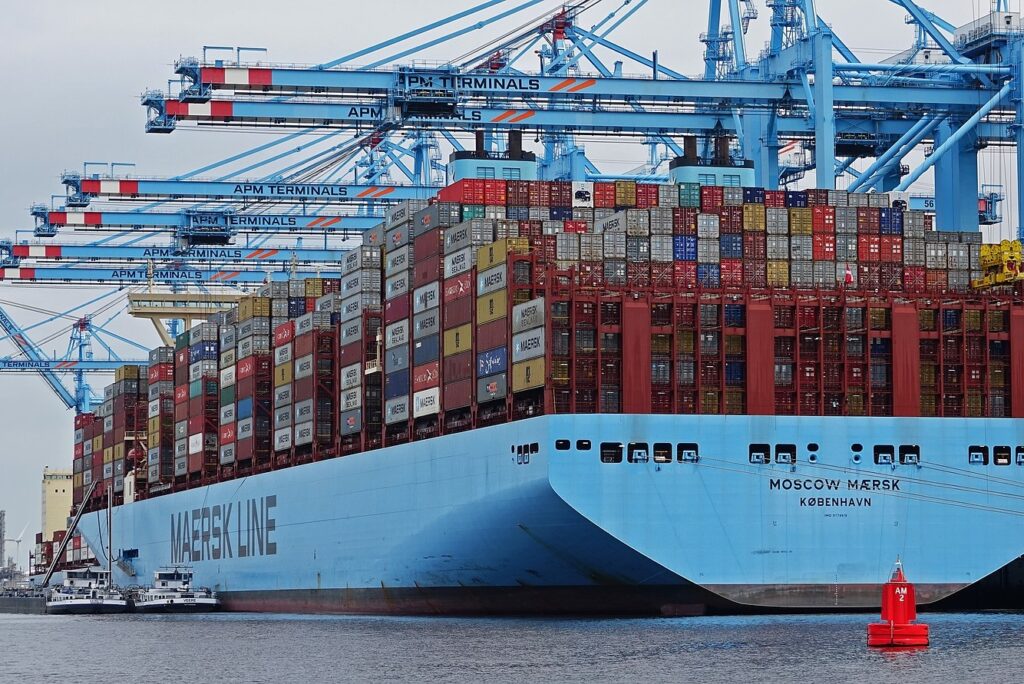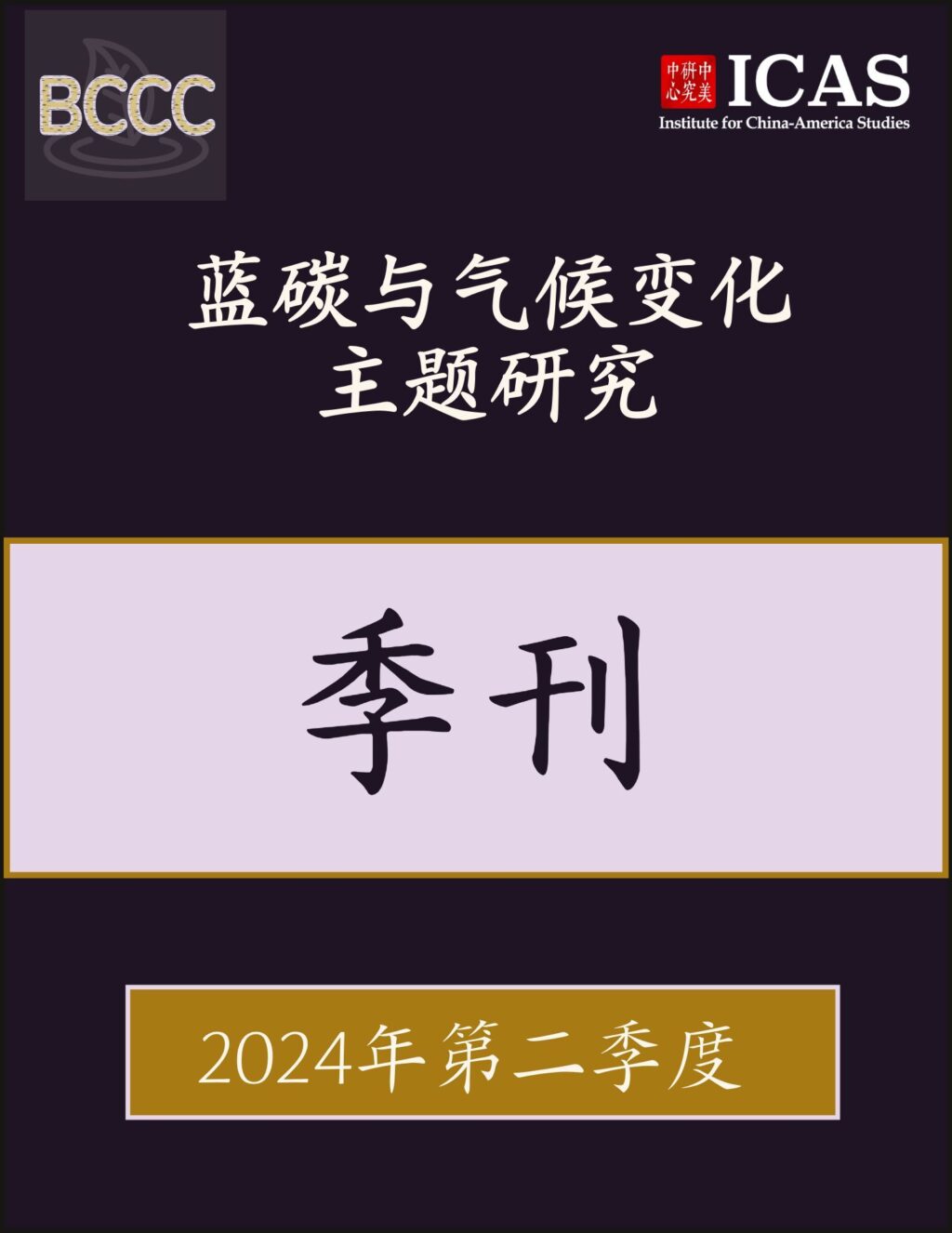
ICAS Bulletin (online ISSN 2836-3418, print ISSN 2836-340X) is published every other week throughout the year at 1919 M St NW, Suite 310, Washington, DC 20036.
The online version of ICAS Bulletin can be found at chinaus-icas.org/bulletins/.

– Democratic presidential nominee Kamala Harris picked Tim Walz as her running mate, a governor from Minnesota who lived and taught in China in 1989 and led multiple educational exchanges in the 1990s. In 2016, Walz said that he does not think that “China necessarily needs to be an adversarial relationship.”
– Republican Senator Marco Rubio criticized Walz’s nomination on X, saying that “Walz is an example of how Beijing patiently grooms future American leaders.”
– Harris’ campaign responded to Republican criticism in a statement, saying that Walz “has stood up to the CCP…[and] will always stand up for our values and interests in the face of China’s threats.”
– Walz’s nomination trended on Chinese social media, receiving more than 12 million views on the Chinese social media site Weibo. Some Weibo users said that Walz’s “unique background gives him a real perspective on China.”
– Though the Chinese embassy in Washington declined to comment on Walz’s nomination, a foreign policy analyst in Shanghai, China said that “Beijing is probably more fearful and uncomfortable with such a foreigner who understands China.”
Associated News References:
“Kamala Harris’ VP pick has a long history with China. But Beijing may not be happy about it,” CNN, August 9
“Walz’s China resume gets a lot of attention,” Politico, August 9
“’Harris’s no 2 taught in China’: Chinese internet reacts to Walz,” BBC, August 7
“Walz’s long history with China draws attacks and praise,” Reuters, August 7

– China tied with the United States for the first time with 40 gold medals at the 2024 Paris Olympics. However, a notable group of users on Chinese X-like site Weibo claim that China actually overtook the United States with 44 gold medals since “Chinese Taipei and Hong Kong” should be included as a part of China.
– In reaction to China’s gold medal tie with the U.S., Chinese state media Global Times said that “the changes in the Olympic achievements of China and the US should not be viewed in isolation — this shift itself is a reflection of an unstoppable historical trend.”
– On August 8, the China Anti-doping Agency called on the International Testing Agency to “intensify testing on U.S. track and field athletes” in response to Erriyon Knighton’s participation in the Olympics despite testing positive for banned substances.
– The agency further accused the U.S. on August 6 of double standards, saying that the U.S. had been “trying its best to clear American athletes on one hand…[while] accusing CHINADA and the World Anti-Doping Agency of ‘covering up the truth’.”
– Following China’s victory in the men’s 4×100 swimming relay, the Chinese embassy in Washington released a statement that urged the U.S. to “stop using the doping issue to smear and suppress China.”
Associated News References:
“U.S. and China Tied for Gold at the Olympics. Some in China Disagree.,” The Wall Street Journal, August 12
“China Touts Olympic Gold Medal Tie With US as New Sign of Power,” Bloomberg, August 12
“China urges ITA to intensify testing of US athletes,” Reuters, August 7
“CHINADA accuses USADA of double standards,” Reuters, August 6
“China’s internet explodes with pride at ending US swim relay reign – and a sense of vindication,” CNN, August 5

– According to a Wall Street Journal report, Huawei is allegedly ready to introduce a new AI chip that is comparable to NVIDIA’s advanced H100 chip. Washington had barred exports of H100 chips to China last year due to national security concerns.
– On August 8, a Senate bipartisan group introduced a bill that would restrict textile and apparels from being imported through the ‘de minimis’ provision. Lawmakers behind this bill explicitly called out Shein and Temu for abusing this provision.
– Unnamed sources say that Chinese tech giants like Baidu and Huawei are stockpiling high bandwidth memory chips from Samsung in preparation for the upcoming U.S. semiconductor export restrictions.
– U.S. Commerce Department is planning to issue a new rule that would ban Chinese advanced autonomous vehicle software in U.S. vehicles out of concern “about the national security risks associated with connected technologies in connected vehicles.”
– After U.S. lawmakers expressed concerns over UAE-based AI company G42’s ties with China, the firm’s spokesperson said that the firm is working to “comply ”with the highest global standard“ for AI and that “it is entirely understandable and appropriate for the U.S. government to be interested…” in the security of advanced AI technology.
– The Biden Administration is planning to introduce a new rule that would restrict China’s access to Samsung’s AI memory chips. In response to Bloomberg’s inquiry, the Chinese Foreign Ministry spokesperson said that “US measures won’t stop China’s technological progress.”
Associated News References:
“Huawei readies new AI chip to challenge Nvidia in China, WSJ reports,” Reuters, August 13
“U.S. Lawmakers Move to Restrict Trade Provision Favored by China’s E-Commerce Giants,” The Wall Street Journal, August 9˛
“Chinese firms stockpile high-end Samsung chips as they await new US curbs, say sources,” Reuters, August 6
“US expected to propose barring Chinese software in autonomous vehicles,” Reuters, August 5
“UAE-based G42 working with US to meet AI standards amid China concerns,” Reuters, August 1
“US Weighs Restrictions on China’s Access to AI Memory Chips,” Bloomberg, July 31

– Senior officials in the Biden Administration will be in Shanghai on August 15-16 to discuss ways for the United States and China to maintain financial and economic stability and “concrete steps…to improve communication in the event of financial stress.”
– At the opening ceremony of San Diego Zoo’s giant panda area on August 8, California Governor Gavin Newsom declared the day as California Panda Day and said that the celebration of the giant pandas’ arrival is “about celebrating our common humanity.”
– U.S. Ambassador to China Nicholas Burns remarked in a statement to The New York Times that the United States “remained dissatisfied about the lack of transparency” in China’s disclosure of the stabbing of two American teachers in Jilin, China two months prior.
– The Chinese Foreign Ministry responded to Burns’ statement and defended how it handled the attack, also stating that the United States “has no right to interfere in China’s legal proceedings, nor should it make irresponsible statements.”
– After repetitive requests from the U.S., China has announced that it will impose a new license requirement for the production and sale of three chemicals used for fentanyl production.
Associated News References:
“U.S. Officials to Visit China for Economic Talks as Trade Tensions Rise,” The New York Times, August 12
“California celebrates arrival of first pandas from China in decades,” The Guardian, August 8
“U.S. ‘Dissatisfied’ With China’s Disclosures About Stabbings,” The New York Times, August 8
“China Restricts Fentanyl Chemicals After Years of U.S. Pressure,” The Wall Street Journal, August 7

– On August 7, the Philippines, the U.S., Canada, and Australia conducted a joint naval and air exercise in the South China Sea to underscore their “dedication to upholding international law.” The exercise occurred concurrently with China’s naval and air patrol in the South China Sea.
– The U.S. Navy listed Australia’s Cocos Islands as a possible site for U.S. military construction under the Pacific Deterrence Initiative that is reportedly aimed at countering China.
– On August 1, President Joe Biden signed the U.S. National Counterintelligence Strategy which identifies Beijing and Moscow as “the most significant intelligence threats.” The strategy calls for increases in defensive use of AI and offensive campaigns against espionage.
– On July 31, amidst growing tensions with China, the U.S. and Philippine navies conducted a joint maritime exercise in the South China Sea aimed to ensure that the two nations “can effectively collaborate to safeguard our maritime interests.”
Associated News References:
“US, China stage concurrent exercises in the South China Sea,” DW, August 7
“US military eyes Australia’s Indian Ocean toe hold to deter China,” Reuters, August
“Russia, China leading wave of ‘unprecedented’ intelligence threats to US,” Voice of America, August 1
“Philippines, US navies hold joint exercise in South China Sea,” Reuters, July 31

“China’s Hesai to be removed from US defence department blacklist,” Financial Times, August 13
“US bans imports from five more Chinese companies over Uyghur forced labor,” Reuters, August 8
“US tops China as Germany’s biggest trading partner,” Reuters, August 8
“Maersk says companies are bringing orders forward on US-China trade war threat,” Financial Times, August 7
“Qatar invests in US-backed fund to loosen China dominance of critical minerals,” Financial Times, August 7
“Chinese American scholar convicted of spying on dissidents for Beijing,” The Washington Post, August 6
“Sharpie-maker Newell moves more operations from China as tariffs loom,” Reuters, August 6
“Chinese businesses hoping to expand in the US and bring jobs face uncertainty and suspicion,” AP, August 5
“China stands by Maduro in Venezuela to safeguard its investments,” Voice of America, August 3
“Anheuser-Busch InBev Beer Sales Dragged by Weaker China Demand,” The Wall Street Journal, August 1
“China accuses Japan of ‘smear attacks’ in recent talks with the US, India and Australia,” ABC, July 31
“China sanctions US Rep. McGovern for ‘interference’ in its domestic affairs,” AP, July 31
August 9 hosted by US-Asia Institute
August 8 hosted by Center for New American Security
August 7 hosted by Foreign Policy Research Institute
August 1 hosted by Hudson Institute
August 20 hosted by Quincy Institute for Responsible Statecraft
August 23 hosted by Asia Society
September 4 hosted by Foreign Policy
September 25 hosted by Harvard Fairbank Center for Chinese Studies
Blue Carbon & Climate Change 2024 Q2 (Chinese Version) Soon to Be Released!
The ICAS Blue Carbon & Climate Change Program will release its Chinese BCCC Quarterly newsletter for 2024 Q2 on WeChat shortly. This issue features a ‘Theme of the Quarter’ on “AI’s Role in Solving Climate Change” and a ‘Blue Carbon Country Profile’ on Brazil.’
Released each quarter, the BCCC Quarterly records the most important trends and developments regarding blue carbon policies and regulations in China, the U.S., and other regions, as well as international regimes, such as under the United Nations framework. It also includes two special sections—the ‘Theme of the Quarter’ and the ‘Blue Carbon Country Profile’—that aim to bring a fresh and applicable element to each issue.

On Wednesday, August 7, 2024, Senior Fellow Sourabh Gupta was quoted by South China Morning Post on China’s foray into Ukraine and Middle Eastern diplomacy.

The Institute for China-America Studies is an independent nonprofit, nonpartisan research organization dedicated to strengthening the understanding of U.S.-China relations through expert analysis and practical policy solutions.
1919 M St. NW Suite 310,
Washington, DC 20036
icas@chinaus-icas.org
(202) 968-0595
© 2025 INSTITUTE FOR CHINA-AMERICA STUDIES. ALL RIGHTS RESERVED.